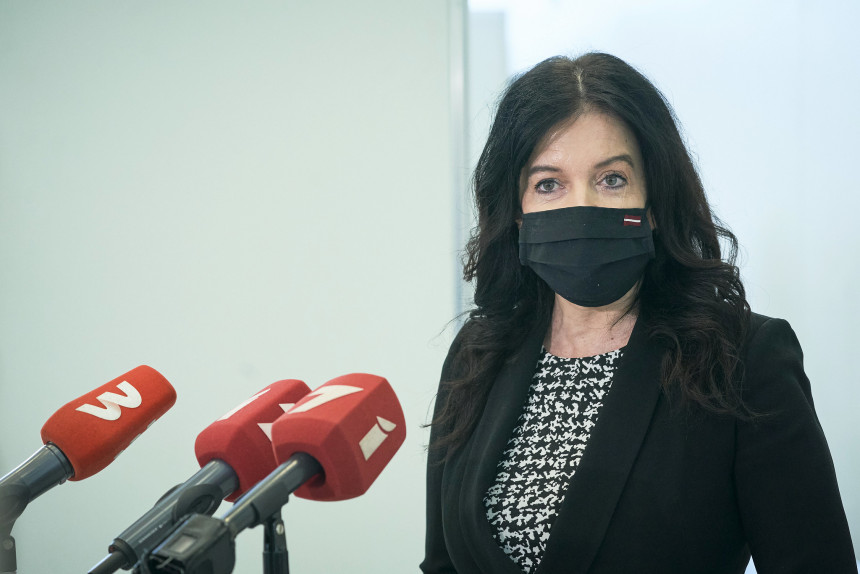MoW Ramona Petraviča: There is no uniform approach to Covid statistics in the country

Minister of Welfare Ramona Petraviča (KPV LV) has recently been berated for slow vaccination against Covid-19 in social care centers. They are being blamed for the sharp deterioration of the epidemiological situation in some municipalities. However, the Minister believes that the ministry headed by her has done everything possible within the limits of her competence, moreover, she has discovered some strange things both in the form of recording the infected and in terms of the spread of the disease.
After R. Petraviča was summoned by the Saeima faction Development/For! (Attīstībai/Par!), which the Minister of Health Daniels Pavļuts is a part of, to report on the reasons for the slow vaccination, the Minister of Welfare announced that in several social care centers (SCCs), polymerase chain reaction (PCR) Covid-19 tests and antibody express tests have yielded conflicting results. Information was received from at least three SCCs regarding erroneous test results. For example, on March 15, SCC Ērgļi performed PCR tests on 46 clients, ten of which were positive. Express tests were then performed, which did not reveal any positive cases, and the same results were given by the PCR tests that were performed the following day.
Guntis Gladkins, Chairman of Rūjiena Municipality Council, pointed out the SCCs in the municipality to explain the rapid deterioration of the epidemiological situation. However, the minister believes that false-positive cases of Covid-19 may have been detected in the centers.
This issue is now being addressed by the National Health Service, which has issued an official letter to the National Reference Laboratory requesting information on the quality of Central Laboratory testing and the interpretation of the results of these tests.
You have been repeatedly berated for the lack of vaccination in social care centers (SCCs) and the rapid spread of Covid-19 in them. It was then found that the test results were inconsistent in several centers. In the light of this information, is there still reason to believe that the spread of Covid in SCCs is catastrophic?
We couldn't even be really to blame for the pace of vaccination, because all we were asked to do was to interview clients and employees on who is ready to get vaccinated or is still thinking about it - we did all of that. We set up vaccination rooms in each care center.
How well the vaccination went depended on the vaccination office and collaboration with GPs. There were branches in Latgale where vaccination was started just last week. For example, in Litene it began only on Thursday. There were delays for unknown reasons.
Since the vaccination was very delayed, it started only on February 10, if I remember correctly, it was planned to be completed in a couple of weeks, but dragged on until the end of March. But overall, vaccination will definitely continue for a very long time, because clients who have recovered from Covid will be vaccinated after 90 days. We wrote a letter to the Ministry of Health about whether it is possible to do the second vaccine sooner, we have not received an answer yet.
Positive tests are currently emerging for those vaccinated with the first vaccine. It is not clear what to do if a positive test is found.
It is good that we have been told about these contradictions, but there is also more confusion about them - only clients have tested positive, not employees. All employees have negative tests.
I asked Perevoščikovs [Jurijs Perevoščikovs, Director of the Infectious Diseases Risk Analysis and Prevention Department of the SPKC] if anyone is interested in studying how the virus originates or whether the virus is born in a room. We have also had a case where employees have negative tests but a bedridden client has a positive one. I do not know whether these discrepancies and ambiguities can be attributed to errors in transporting the tests, nor can they be attributed to the fact that the samples may have been taken incorrectly.
I had convened a remote meeting with the SCC and municipality leaders, and no one had contacted them from the Ministry of Health or the laboratories to pay attention and understand what had really happened.
You provided information in government about the contradictions in the tests, although the competencies of the ministry you head are slightly different. How do you think these discrepancies affect Covid prevalence statistics?
It seems to me that there is no uniform approach in the country in terms of statistics, because in the branch Gudenieki we found quite a lot of positive tests for those who had already received the first vaccine. But epidemiologists said they could not be considered positive at all since they have received the first vaccine. Maybe the vaccine elicits a reaction that shows the test to be positive, but it is not known whether these should be shown in the statistics and whether those clients should also affect the municipality's statistics.
How are SCC clients and staff currently vaccinated, what is the response rate and are vaccines available in sufficient numbers?
When initially interviewing clients, 80% were ready to be vaccinated. Employees were less so. At the moment, it must be said that the desire to be vaccinated is disappearing a bit, also due to the news about AstraZeneca. Clients are less likely to be influenced by social networks because they do not use them, but they are influenced by employees, which to some extent affect clients' choices. At the moment, it seems that those who were undecided are now refusing the vaccine.
*****
Be the first to read interesting news from Latvia and the world by joining our Telegram and Signal channels.
